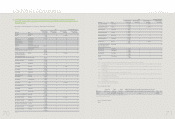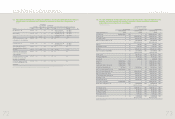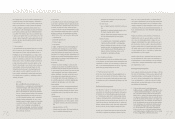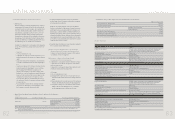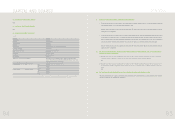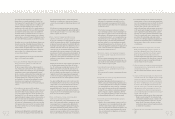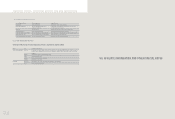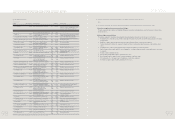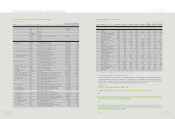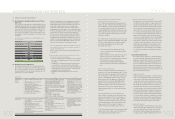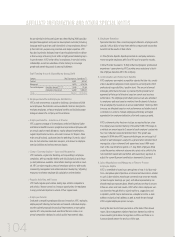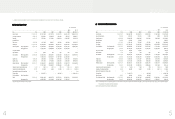HTC 2009 Annual Report Download - page 46
Download and view the complete annual report
Please find page 46 of the 2009 HTC annual report below. You can navigate through the pages in the report by either clicking on the pages listed below, or by using the keyword search tool below to find specific information within the annual report.
90 91
(2) Future Investment Plans
Long-term strategic investments made by the corporation focus prima-
rily on supporting HTC's business success and growth in its main
business. Investment and acquisition decisions are taken based on the
benefit of such to the design and development of future products,
expansion of sales and long-term development of the corporation.
Practical objectives of such investments include reducing the cost of
products, raising the quality and inherent value of products, enhancing
the convenience of product user interfaces, strengthening customer
service and increasing overall operational effectiveness. Major invest-
ments planned for our main business address the areas of mobile con-
tent, communications, mobile and information security, location based
services, entertainment and user interface / experience innovation.
Investments currently approved by the board of directors include
increasing the capital of High Tech Computer Asia Pacific PTE, Ltd.
This is because of a transfer-in due to the reorganization of HTC's over-
seas subsidiaries' investment structure.
HTC will focus on investments in the China market along with related
mobile digital services and applications in the coming year.
VI. RISK FACTORS OF RELEVANCE TO HTC BUSI-
NESS OPERATIONS
(1) Potential Factors of Influence on HTC Competitiveness &
Growth Goals and Related Measures / Countermeasures
Competitiveness in the sector in which HTC competes comes primarily
from factors including: 1) product R&D and innovation capabilities; 2)
strategic partnership relationships with industry leaders, and 3) an inci-
sive understanding and grasp of market trends. In addition to strong
competencies in these areas, HTC maintains strong global business
development, streamlined production management and global logistics
capabilities - adding further depth to its overall competitive position.
Factors Favorable to the Achievement of HTC Growth Goals
1. Partnerships with Industry Leaders Allow HTC Role in Leading
Industry Change and Trends
Since the very beginning, HTC has leveraged partner relationships with
industry leaders like Microsoft, Qualcomm and Google as well as glob-
al telecommunications service providers to fuel development and
expansion of the smart phone market. Examples include HTC's launch
of the world's first Windows Mobile and Android smart phone models.
Committed to more than just innovating and improving its own prod-
ucts, HTC actively looks to influence and shape industry trends in part-
nership with industry leaders.
2. Long-Term Cooperation with Telecom Service Providers Give
HTC a Direct Window onto Consumer Needs and Preferences
Over the years, HTC has fostered unique partner relationships with
major international telecommunication service providers. These include
Europe's five leading telecommunications companies, the four most
important telecommunication service providers in the United States and
many of the fastest growing telecommunication service providers in
Asia. These partnerships are a cornerstone of HTC's strategy to channel
HTC products to a global and growing mass-market audience. Such
close relationships both help HTC understand consumer demands in
depth and provide opportunities to customize products and services to
meet particular service provider needs - thus better satisfying end user
needs and desires.
3. Market Growth Continues Unabated; Diversified Mobile Digital
Services Move Smart Phones into Mass Market
New mobile phone operating systems such as OS X (iPhone) and
Android have electrified the market for mobile applications. Easy to
download and begin using, many applications are available for social
networking, shopping, traveling, games and so on. The literal new uni-
verse opened up by this ever-expanding catalogue of mobile applica-
tions is enticing more and more consumers over to smart phones,
causing research forecasts to predict that the smart phone sector will
continue on a strong growth track for the coming several years.
Ongoing telecommunication service provider investments in 3G net-
work infrastructures are also expected to further spur broad based
"trading up" by consumers from traditional mobile phones to smart
phones - promising to further boost HTC sales and growth into the
future.
4. Reorientation of HTC Corporate Culture Enhances
Organizational Strengths and Raise HTC Global Brand Value
and Recognition
We redefined the image and focus of the proprietary HTC brand in 2009
with the launch of the "Quietly Brilliant" campaign. This slogan clearly
places the consumer at the core of HTC's business. Concurrent with the
campaign, HTC launched a reorientation of its corporate culture to see
its new brand focus actively and fully implemented. HTC further recruit-
ed top new talent to fill senior management positions in global sales,
marketing and design; bolstering HTC management team capabilities
and raising the effectiveness of global brand strategy implementation.
5. Tightly Knit Working Groups and Exceptional Implementation
Capabilities Underpin HTC Global Logistics and Cost Control
Mechanisms
In addition to strong financials and world-class R&D capabilities, HTC
maintains state-of-the-art production lines and global logistics systems
certified under strict international standards, including ISO-9001, ISO-
14001, TL-9000 and OHSAS 18001. Such underlie HTC's unique posi-
tion in the smart phone sector. Success, and its continuance, relies on
the dedication and effort of all HTC employees and to commitment
throughout the HTC organization to innovation and excellence. At HTC,
we foster close cooperation amongst departments, ensure the effective
implementation of plans and directives, effectively manage global
logistics and rigorously control costs.
6. Comprehensiveness and Supportive of Domestic Industry
Infrastructures
The industrial infrastructure in Taiwan, benefitting from public and pri-
vate sector investments, is increasingly comprehensive in terms of
HTC's business needs. Critical components such as printed circuit
boards, resistors, capacitors, chipsets, power supplies and modules are
produced domestically. Taiwan also offers a plentiful supply of quali-
fied technical staff. Such have been critical to Taiwan's development of
increasingly sophisticated production automation controls and sys-
tems, streamlined cost structures, flexibility and strong management
capabilities to win business and remain a viable link in the internation-
al supply chain.
Factors Adverse to the Achievement of HTC Growth Goals,
and Relevant Countermeasures
General optimism regarding the long-term growth and development of
the smart phone sector has encouraged many current and potential
competitors to invest in the market. Under such a scenario, we antici-
pate that mobile telecommunication devices will be increasingly
designed to serve an expanding menu of applications, incorporate
increasingly diverse functions, anticipate shorter product life cycles
and enter an increasingly competitive market. To address relevant
challenges, HTC has adopted countermeasures as follows:
1. Work actively to establish HTC brand awareness and value in order
enhance global brand loyalty and recognition. Effective branding
activities and product sales promotions will be leveraged to ensure
that HTC becomes the "first name" in smart phones in the minds of
consumers.
2. Redouble emphasis on R&D and innovation to maintain HTC's
leading competitive edge. HTC will stress innovation in terms of
product differentiation and user experience to provide consumers
an array of products geared to satisfy diverse consumer needs. In
2009, HTC launched its proprietary user interface - HTC Sense,
which was developed by observing how people live and communi-
cate. HTC Sense, rooted in consumer habits, preferences and
needs, is an exceptionally easy to use, intuitive portal to the vast
world of mobile applications.
3. Expand relationships with current customers in the realms of prod-
uct design, volume production, technical support and assistance,
distribution, and after-sale service in order to further nourish strate-
gic partnerships with leading multinational corporations. Keep a
step ahead of relevant global and market trends to extend opportu-
nities for growth and development.
4. HTC plans and puts in place efficient global materials supply and
logistics support systems as one critical component in the compa-
ny's global logistics model. Volume buying will be leveraged to
lower input costs, while a materials requirement planning (MRP)
system will be engaged to manage material inventories and antici-
pate replacement needs. Such measures will help lower inventory
management costs and reduce inventory devaluation and obsoles-
cence losses. In terms of our current reliance on multiple channels
for input supplies, HTC continues to identify and build supplier
relationships that cover multiple material input needs and enhance
supply stability. Our objective remains a consistent and uninter-
rupted supply of all material inputs obtained within a highly com-
petitive cost structure.
5. The productivity of each link in HTC's business chain is being
maximized, with enhanced time management, standardized work-
flows, and the comprehensive implementation of ISO quality con-
trol policies. Benefits will include lower process and communica-
tion costs and comprehensive quality management to raise HTC
competitiveness.
6. At present, critical components for HTC products are still pur-
chased from suppliers located overseas. However, even so, HTC's
leadership position and strong technical grounding mean that all
suppliers have been exceptionally willing to accommodate and
meet HTC priorities in order to maintain and expand their own mar-
ket sales. As we manage our relationships with all suppliers as
important strategic alliances, we are able to secure their further
support, which has helped further lower our costs of materials pur-
chases.
7. As the most vibrant and fastest growing sector of Taiwan's econo-
my, the electronics industry requires a steady stream of human
resources. Layoffs and downsizing in the general manufacturing
sector have increased the difficulty in finding and hiring entry-level
workers. Thus, HTC plans to continue bringing entry-level workers
from overseas to work in its domestic operations while working
closely with academic organizations to help increase domestic hir-
ings in the future.
(2) Risk Issues
An analysis of positive and negative factors affecting the markets and
sectors in which HTC operates offers the following assessment of risks
faced by the corporation and related response measures.
1. The effects of interest rate changes, exchange rate
fluctuations and price inflation on HTC's profitability,
and anticipated response measures to be taken:
Impact on HTC profitability:
Item 2009(NT$1,000 or %)
Net Interest Income 348,562
Net Forex Income 531,782
Net Interest Income as percentage of net revenue 0.24%
Net Interest Income as percentage of Earnings Before Tax 1.38%
Net Forex Income as percentage of net revenue 0.37%
Net Forex Income as percentage of Earnings Before Tax 2.11%
Note: Calculated on HTC single-alone financial numbers
Working capital required to support the expansion of HTC business
operations has over recent years been supplied exclusively from inter-
nal finances. As the corporation has taken out no long-term loans,
fluctuations in interest rates have had no effect on corporate debt. In
terms of its finances, HTC has held to a relatively prudent policy of
pursuing healthy and healthy growth. Asset allocation decisions place
priority on security and fluidity, with most funds kept in NT dollar
denominated time deposit accounts. In 2009, HTC time deposit rates
earned an average return of 0.57%, with interest earned totaling
NT$350 million.
FINANCIAL STATUS, OPERATING RESULTS AND RISK MANAGEMEN


